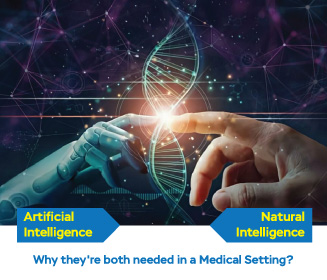
With so many people in the global population, the healthcare sector is busier than ever. As a result, the integration of artificial intelligence (AI) has become a hot topic. Is this technology the way forward, or is it putting extra pressure on healthcare professionals and devaluing training and instinct?
There’s no denying that AI is revolutionizing various aspects of medicine, from diagnostic imaging to personalized treatment plans. Yet, despite all these advancements, natural intelligence – the intuitive, empathetic, and experience-based knowledge possessed by healthcare professionals – remains irreplaceable. In this post, we look at why understanding why both types of intelligence are crucial, and can help us build a more efficient and compassionate healthcare system.
What role does AI play in healthcare?
AI is being increasingly incorporated into healthcare settings in order to analyze complex medical data. The primary aim of using it is to enhance human decision-making, streamline operations, and improve patient outcomes – not to replace doctors.
Key applications of AI in healthcare:
-
- Diagnostic imaging: AI algorithms can analyze medical images with a level of detail and speed that surpasses human capabilities. This means it may be able to pick up things that tired doctors cannot – especially useful in busy and high-risk settings.
- Predictive analytics: AI can predict patient outcomes based on historical data, aiding in early diagnosis and treatment planning. Doctors are restricted by their own experience and research, whereas AI can learn from data across the world.
- Personalized medicine: Machine learning models can recommend personalized treatment plans based on a patient’s genetic information and medical history. Again, AI can learn from patient data worldwide (with proper security measures in place) to share details of new treatments that may help.
- Administrative efficiency: Chatbots and automated systems can handle routine administrative tasks, freeing up healthcare professionals for more critical work.
-
- Lack of bias. AI itself is not biased, because it cannot feel emotion. Whilst that doesn’t stop the original data from being biased, this technology can look at the situation objectively, improving the patients’ experience.
In summary, AI can be particularly useful for improved data analysis and decision-making, as well as for improving efficiency. It can also reduce mistakes in high-pressure, busy settings, helping ensure consistency of treatment across patients.
The vital role of natural intelligence
Natural intelligence encompasses the skills, intuition, and experience that healthcare professionals bring to their practice. While AI can process and analyze data at unprecedented speeds, it lacks the emotional intelligence and nuanced understanding that human professionals possess – something that is often vital in difficult, emotionally-intense situations.
Key attributes of natural intelligence:
- Empathy and compassion: Human healthcare providers can offer emotional support and build trust with patients – an essential component of effective care. Just because there’s a most logical option from a data perspective doesn’t mean it’s necessarily the right one for every patient.
- Clinical judgment: Experienced professionals can make complex decisions based on a combination of data and their professional intuition. Whilst symptoms may indicate a certain condition, doctors and nurses may be able to tell that there is something else at play that needs investigating. This is especially true for vulnerable patients, who may need an environment where they feel safe to be fully honest.
- Ethical considerations: Natural intelligence plays a crucial role in navigating ethical dilemmas and making patient-centered decisions. It’s also important to ensure patient dignity and this isn’t always accounted for in a fact-based approach.
- Adaptability: Humans can adapt to unforeseen circumstances and think creatively in ways that AI cannot. Healthcare professionals are also right there, in the moment – even if the data says that something should be true or that some supplies are in the cupboard, they can judge for themselves the reality of a situation.
Ultimately, AI cannot be empathetic. Whilst there’s an evidence-based center to medicine, which is where AI can help, it’s the people that provide the service and are there for patients at often their toughest times.
Why both are essential in medicine
The dichotomy between artificial and natural intelligence is not an either/or scenario but rather a complementary relationship – both have their place. Each brings unique strengths to the table, and their combined application can significantly enhance the quality of healthcare delivery. Let’s look at how they can work together.
Enhanced diagnostic accuracy
AI systems excel at identifying patterns and anomalies in vast datasets, which can significantly improve diagnostic accuracy. However, a clinician’s experience and intuition are indispensable for interpreting these findings in the context of a patient’s overall health and history.
AI can be particularly helpful in identifying more common conditions, freeing up time for professionals to focus on complex cases. However, it’s important not to assume a diagnosis based on AI alone – even a quick case check is still needed so that conditions don’t get missed.
Improved efficiency and reduced burnout
Administrative tasks and routine diagnostics can be efficiently handled by AI systems, allowing healthcare professionals to focus on patient care. Tasks such as sending patient notes after an appointment or shift scheduling can take up significant amounts of collective time, but they’re not medical tasks. Used correctly, AI has the potential to not only improve efficiency but also help reduce burnout – a significant issue in the healthcare industry.
Personalized patient care
AI can provide data-driven insights for personalized treatment plans, but the human touch is essential for tailoring these plans to the individual needs, preferences, and circumstances of each patient.
Ethical decision-making
While AI can offer recommendations based on data, ethical decision-making requires a human touch. Healthcare professionals’ ability to weigh the pros and cons of each decision, considering the patient’s values and wishes, is irreplaceable.
Conclusion
Artificial and natural intelligence each have their own strengths and limitations. In the medical setting, neither can fully replace the other. Instead, the synergy between AI and healthcare professionals can lead to better patient outcomes, enhanced efficiency, and more humane care.
Combining the precision and speed of AI with the empathy and clinical judgment of healthcare professionals has the potential to create a more robust and effective healthcare system.
For medical students and healthcare professionals, understanding and leveraging both types of intelligence is key to navigating the future of medicine. Increasing your own knowledge by following the latest updates online and via specialist conferences is the best way to support your continued growth as an excellent medical professional.
Stay Updated on Top Conferences in Europe!
Subscribe to get the latest updates on upcoming academic conferences across Europe, covering engineering, medicine, business, AI, and more. Delivered straight to your inbox!
Get Conference Alerts





